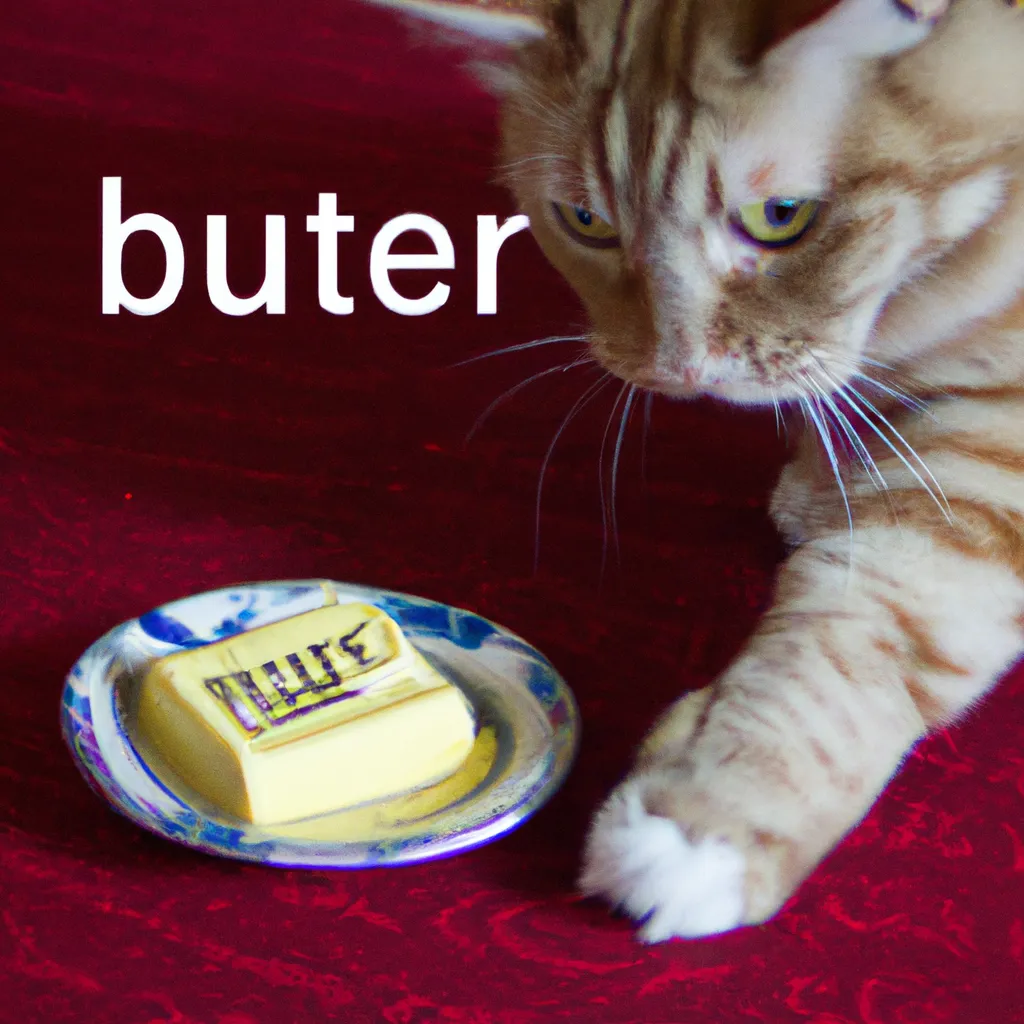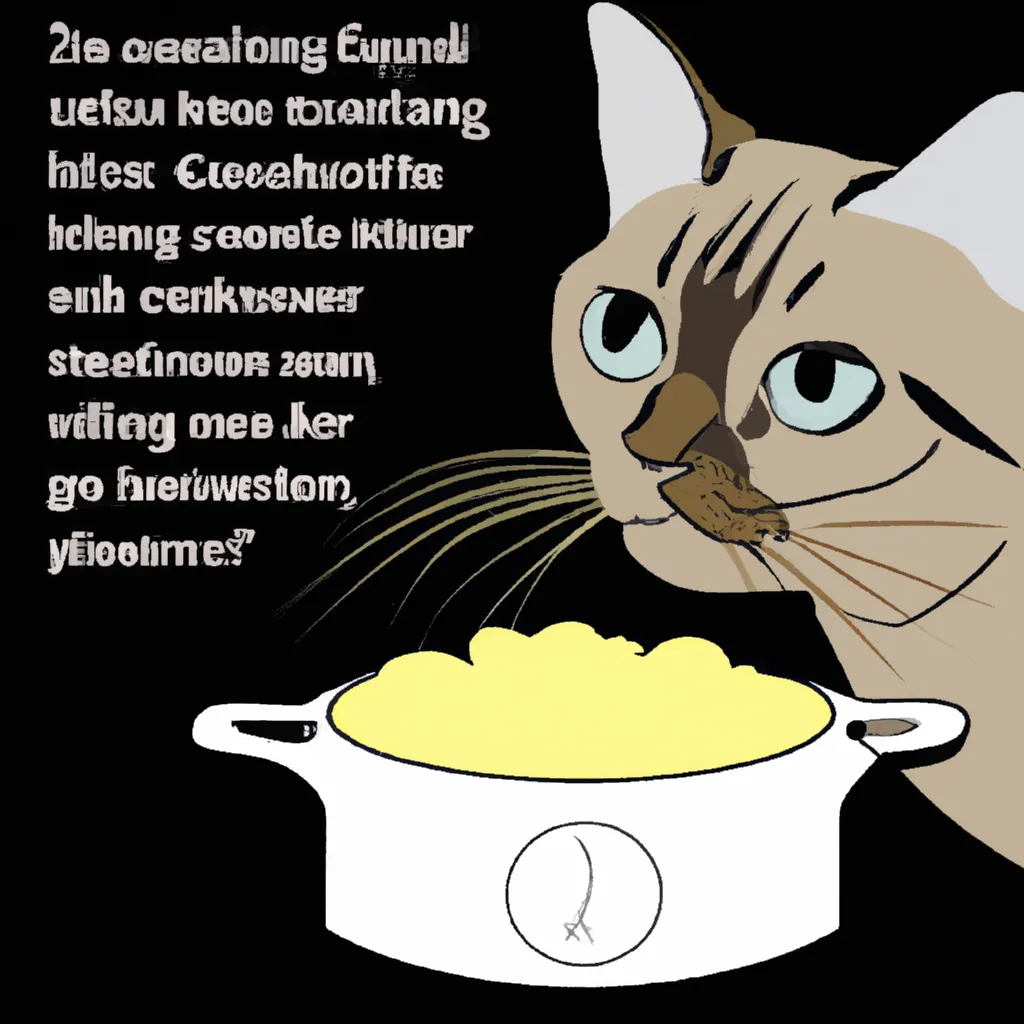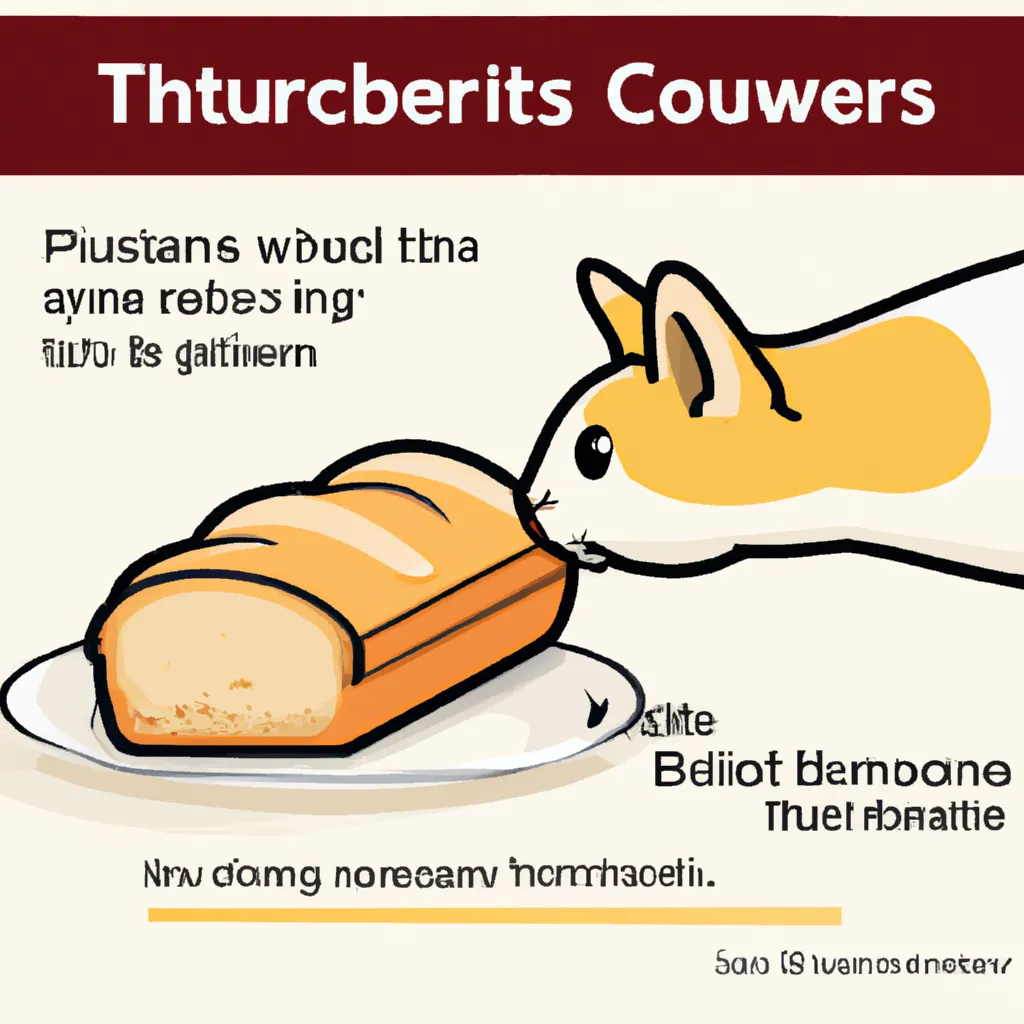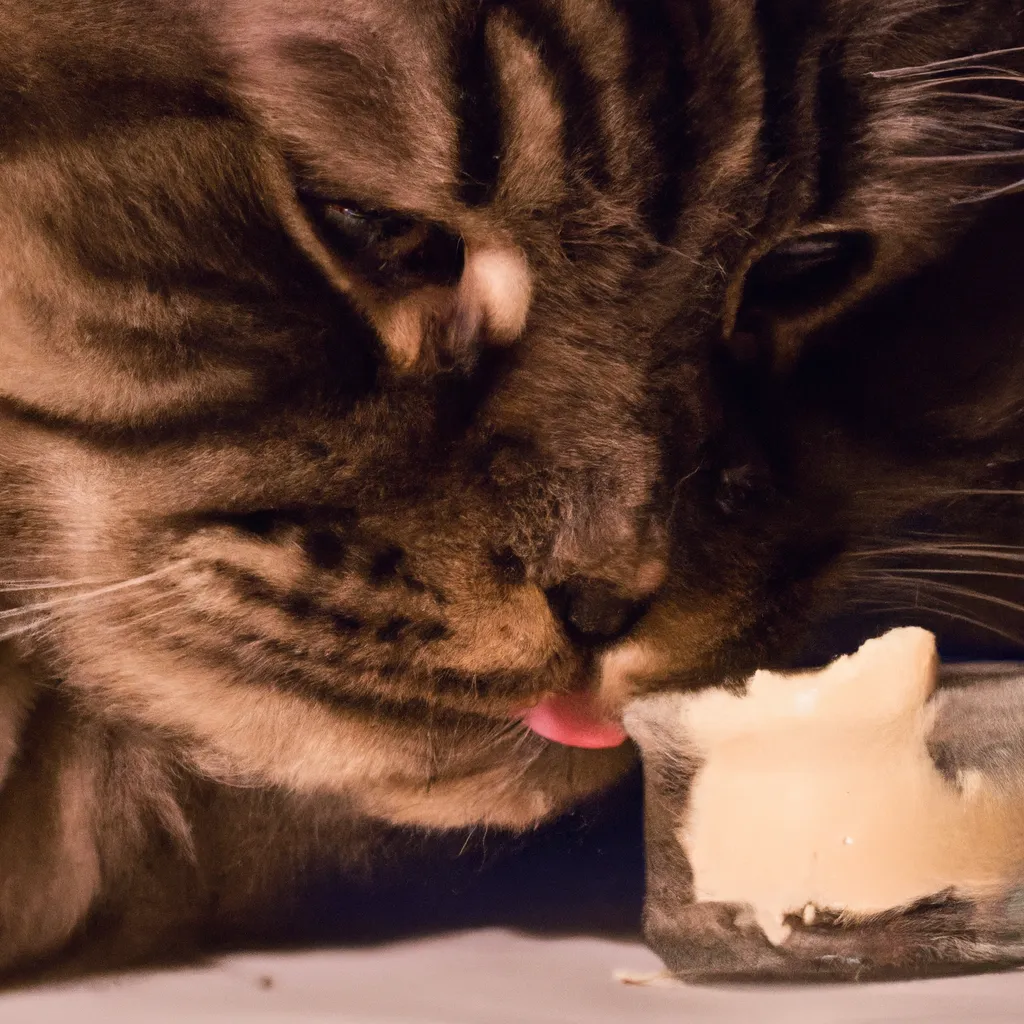Unraveling the culinary conundrum of whether our feline companions can partake in the simple pleasure of butter, this article delves into the creamy depths of this widely adored dairy product, and its potential effects on cats. As cat lovers and specialists, we are often faced with questions about the appropriateness of certain foods for our furry friends. From butter beans to butter bread, and from butter chicken to butter pecan ice cream, the buttery spectrum is vast and varied. Yet, do we truly understand the implications of these foods on the health of our beloved whiskered companions?
Our feline friends are notorious for their curious nature and their uncanny ability to find their way into our food. But when it comes to butter, a staple in many households, the question arises: is it a harmless indulgence or a hidden hazard? This article will scrutinize the potential risks and benefits associated with cats consuming butter, providing you with a comprehensive understanding of the subject.
We’ll explore the symptoms of butter poisoning in cats, discuss the toxicity levels, and provide guidance on what to do if your cat has indulged in a buttery treat. We’ll also delve into the more peculiar questions: do cats have a preference for butter? Is it possible that butter could have any health benefits for cats? And, can cats eat butter in its various forms, such as in cookies, biscuits, or even popcorn?
Furthermore, we’ll investigate some butter-esque alternatives that could be safer for your feline friend. And to wrap it all up, we’ll provide insight into the best food choices for cats, helping you make informed decisions that ensure the health and happiness of your feline companion. So, whether you’re a seasoned cat owner or a novice, join us as we embark on this buttery exploration, unearthing the truth about cats and butter.
Is butter Bad for Cats?
Yes, butter can be harmful to cats if ingested excessively. As feline aficionados, it’s crucial to understand that our beloved companions’ digestive systems are not designed to handle large amounts of dairy products, including butter. Butter, being high in fats, can lead to weight gain and obesity-related issues in cats, not to mention potential digestive upsets. Additionally, it may contribute to the development of pancreatitis, a serious and potentially life-threatening condition. While a small lick of butter won’t necessarily harm your cat, it’s best to avoid making it a regular part of their diet. Instead, opt for cat-friendly treats that support their health and well-being. Remember, when it comes to our furry friends’ nutrition, moderation and balance are key.
Why is butter bad for cats?
Butter, while seemingly harmless, is actually detrimental to our feline companions’ health due to its high fat content and lactose levels. Cats, being obligate carnivores, have a digestive system designed to process proteins, not the high fat and dairy content found in butter. This can lead to obesity and other health issues such as pancreatitis, a potentially life-threatening inflammation of the pancreas. Moreover, many adult cats are lactose intolerant, and the lactose in butter can cause digestive distress such as diarrhea or vomiting.
What are the symptoms of butter Poisoning in Cats?
Recognizing the signs of butter poisoning in cats is crucial to ensuring their well-being. Symptoms may vary, but often include gastrointestinal issues such as vomiting, diarrhea, and decreased appetite. In more severe cases, cats may exhibit signs of pancreatitis, which can include abdominal pain, fever, and lethargy. Additionally, due to the high fat content, prolonged exposure to butter can lead to obesity, a condition that may be indicated by rapid weight gain and difficulty in movement. If any of these symptoms occur after your cat has ingested butter, it’s essential to seek veterinary attention immediately.

How much butter is toxic to cats?
While butter is not immediately toxic to cats, consuming large amounts can lead to health complications such as obesity and pancreatitis. Cats, as obligate carnivores, thrive on a diet high in proteins and low in fats and carbohydrates, which is why it’s essential to keep their butter intake to a bare minimum. A lick or two of butter may not harm your feline friend, but consistently feeding them buttery treats can lead to long-term health issues. Remember, moderation is key in maintaining your cat’s health and happiness. As a rule of thumb, it’s best to stick to cat-friendly foods and treats, ensuring they get the right balance of nutrients. So, while your kitty might be purring for that pat of butter, it’s in their best interest to resist those pleading eyes. After all, we want our whiskered companions to lead long, healthy, and butter-free lives!
Can Cats Die From butter?
No, but while butter is not immediately lethal to cats, excessive consumption can lead to serious health complications that might endanger their lives. Butter, being a high-fat dairy product, can cause digestive upset in cats, including diarrhea and vomiting. Long-term, it can contribute to obesity and potentially pancreatitis, a life-threatening inflammation of the pancreas. Furthermore, cats are typically lactose intolerant, and butter’s lactose content can exacerbate these digestive issues. Therefore, it’s essential to moderate your feline friend’s butter intake, treating it as an occasional indulgence rather than a dietary staple. In essence, a lick of butter won’t kill your cat, but a butter-laden diet could lead to severe health problems.
What to do if cat ate butter? How to help?
If your feline friend has indulged in a bit of butter, there’s no need for immediate panic as butter isn’t toxic to cats. However, it’s rich in fats which can lead to digestive discomfort and obesity if consumed in large quantities. If your cat has consumed a large amount of butter, monitor them for signs of gastrointestinal upset such as diarrhea or vomiting. If these symptoms persist, consult your vet immediately. In the future, limit your cat’s access to butter and focus on providing a balanced diet. Remember, while cats can eat butter, it should only be given in moderation, if at all, due to its high-fat content and potential to cause digestive issues.
What will a vet do if a cat is poisoned by butter?
If a cat is poisoned by butter, the vet will initially stabilize the animal to prevent further harm. This usually involves inducing vomiting, administering activated charcoal to absorb the toxins, and providing intravenous fluids to help flush out the poison. In severe cases, hospitalization may be required for further observation and treatment. It’s crucial to remember that butter, although not typically toxic to cats, can cause health issues such as pancreatitis due to its high fat content. Therefore, if your feline friend has ingested a large amount of butter, it’s best to consult your vet immediately.
Do cats like butter?
Yes, cats do like butter. Cats are known to be attracted to fatty foods, and butter is no exception. However, just because they like it doesn’t mean it’s good for them. While small amounts of butter won’t typically harm a cat, regular or large servings can lead to obesity, heart disease, and other health problems. So, while your feline might find the creamy texture and rich flavor of butter appealing, it’s best to limit their intake to an occasional treat or use it as a tool for administering medication, always under vet supervision.
Is butter good (healthy) for cats?
No and while butter isn’t inherently toxic to cats, it’s not particularly beneficial for their health either. Cats are obligate carnivores, meaning their bodies are designed to thrive on a diet primarily comprised of meat. Butter, being a dairy product, is high in fat and lacks the necessary nutrients, like taurine, that cats require. Although a tiny lick of butter won’t harm your feline friend, regular or substantial consumption can lead to obesity and other health issues, such as pancreatitis. Therefore, it’s best to keep butter off your cat’s menu.

Can cats eat butter beans?
Yes, butter beans, also known as lima beans, are safe for cats to eat in moderation, provided they are cooked properly. Raw or improperly cooked beans can contain harmful substances, like lectins, that are toxic to cats. However, once thoroughly cooked, these substances are neutralized. While butter beans can be a source of fiber and protein, they should not replace a cat’s primary diet of meat-based proteins. Remember, variety is key, but always ensure that the mainstay of your cat’s diet aligns with their natural dietary requirements.
Can cats eat butter chicken?
Nos, butter chicken is not exactly a feline-friendly dish. Most cats have a degree of lactose intolerance which can make digesting dairy products like butter problematic. Moreover, the spices and seasonings used in butter chicken, such as garlic and onions, can be toxic for cats. Not to mention, the high fat content in butter chicken can contribute to obesity and other health issues in cats. Therefore, giving your feline friend a taste of your butter chicken isn’t recommended.
Can cats eat butter cookies?
No, butter cookies should be avoided as well. Similar to butter chicken, the butter in cookies can cause digestive discomfort due to lactose intolerance in cats. Additionally, the sugar in cookies is not part of a cat’s natural diet and can lead to obesity and dental problems. Furthermore, some cookies may contain ingredients like chocolate or certain nuts, which are highly toxic to cats. Thus, it’s best to stick to cat-specific treats for your furry friend.
Can cats eat butter pecan ice cream?
No, cats should not eat butter pecan ice cream. While the creamy texture and sweet flavor may seem tempting to share with your feline friend, the high sugar content and presence of pecans can be harmful. Cats, as obligate carnivores, have a digestive system primarily designed to process meat, not sugars. Consuming high amounts of sugar can lead to obesity and diabetes. Furthermore, pecans are not safe for cats. They can cause gastrointestinal upset and, in large quantities, can lead to toxicosis. Additionally, ice cream, in general, contains lactose, which many cats are intolerant to, leading to digestive issues.
Can cats eat butter lettuce?
Yes, cats can eat butter lettuce. This type of lettuce is safe for cats in moderation, as it’s free from toxic compounds that can harm them. However, it’s essential to remember that cats are obligate carnivores, meaning their primary diet should consist of meat. While butter lettuce offers hydration and can be a fun snack, it doesn’t provide the necessary nutrients a cat needs for optimal health. Therefore, if you decide to feed your cat butter lettuce, it should be washed thoroughly to remove any potential pesticides and served in small pieces to prevent choking. Remember, it should only supplement their primary diet, not replace it.
Can cats eat butter biscuits?
Cats can technically eat butter biscuits, it’s not recommended for their diet. Cats are obligate carnivores, meaning their bodies are designed to derive nutrition primarily from meat. The high carbohydrate content in biscuits, combined with the dairy in butter, can lead to digestive issues and obesity in cats. Moreover, some butter biscuits may contain ingredients like chocolate or artificial sweeteners, which are toxic to cats. So, it’s best to keep the butter biscuits to a minimum or avoid them altogether for your whiskered friends. Remember, a cat’s diet should be well-balanced, prioritizing proteins and taurine – an essential amino acid for them.

Can cats eat butter bread?
On the flip side, can cats eat butter bread? Well, the answer is similar to that of butter biscuits. Yes, they can nibble on it, but it’s not advisable to make it a regular part of their diet. Bread, especially when buttered, is high in calories and lacks the essential nutrients cats need. Consuming butter bread could lead to weight gain and nutritional deficiencies in your feline companions. Furthermore, some cats are lactose intolerant, and butter can cause them digestive discomfort. So, while your kitty may be purring for a piece of your buttered toast, it’s best to resist those pleading eyes and stick to cat-friendly treats. After all, we want our feline friends to live their nine lives to the fullest, don’t we?
Can cats eat butter croissants?
No and while cats may find the buttery allure of a croissant irresistible, it’s not necessarily the most beneficial choice for their health. Felines, as obligate carnivores, require a diet primarily composed of meat. Butter croissants, although not toxic to cats, are high in fats and carbohydrates, which can contribute to obesity and other health issues if consumed regularly. Additionally, the butter in croissants is lactose-rich, which some cats might find challenging to digest, potentially leading to gastrointestinal discomfort. Therefore, while an occasional small piece might not harm your feline friend, it’s best to keep butter croissants as a rare treat rather than a dietary staple.

Can cats eat butter for hairballs?
No and when it comes to treating hairballs in cats, butter is not the most appropriate remedy. While it’s true that butter’s slippery texture could theoretically help a hairball pass through a cat’s digestive tract, the high fat content in butter can lead to obesity and other health issues if fed regularly. Additionally, butter does not contain the necessary nutrients to maintain your feline’s overall health. Instead, consider specialized hairball remedies or a high fiber diet that promotes healthy digestion and reduces the formation of hairballs.
Can cats eat butter or olive oil?
No because both butter and olive oil are high in fats, and while they are not toxic to cats, their high fat content can lead to weight gain and other health problems such as pancreatitis if consumed in large quantities. Olive oil, in small amounts, can help with constipation, but it’s not a long-term solution. In general, it’s best to consult with a veterinarian before introducing these elements into your cat’s diet, as they can recommend safe, nutritionally balanced alternatives. Remember, your cat’s health should always be the top priority.
Can cats eat butter popcorn?
No and while cats may show interest in your butter popcorn, it’s not the best snack for them. The primary reason is that cats, being obligate carnivores, struggle to digest lactose found in dairy products like butter. This could lead to gastrointestinal issues such as diarrhea or vomiting. Moreover, the high salt and fat content in butter popcorn can lead to obesity and other health problems in cats. So, even though that tiny morsel of buttery popcorn might seem harmless, it’s best to keep it out of your feline friend’s reach. Remember, what’s tasty for us might not be healthy for our whiskered companions.
Are there safe alternatives to butter for cats?
Now, if you’re looking for safe alternatives to butter for your cat, there are a few options. One ideal substitute is cat-specific treats, which are designed to be both tasty and nutritionally balanced for cats. If you’re preparing homemade food and looking for a butter alternative, consider using fish oil or a small amount of olive oil. Both of these options contain healthy fats that are beneficial for your cat’s coat and overall health. However, they should be used sparingly, as too much oil can lead to upset tummies or weight gain. Always consult with your vet before making any significant changes to your cat’s diet. After all, each cat is unique, and what works for one might not work for another.
What is the best food for cats?
The best food for cats is a balanced diet that includes high-quality commercial cat food, supplemented with occasional treats of cooked meat or fish. Cats, being obligate carnivores, thrive on a diet rich in animal-based proteins, essential fatty acids, vitamins, and minerals. However, it’s important to note that not all human foods are safe for cats, and their diet should be carefully monitored to ensure optimal health. For instance, if you’re wondering about feeding your cat butter, it’s crucial to understand that while butter isn’t toxic to cats, it’s not particularly beneficial either. High in fats and lacking in the essential nutrients cats require, butter should only be given sparingly, if at all. Overconsumption can lead to obesity and other health issues, such as pancreatitis. Therefore, it’s always best to stick to cat-specific foods and consult with your vet before introducing any new food items into your feline friend’s diet.
Subscribe to our email newsletter to get the latest posts delivered right to your email.
